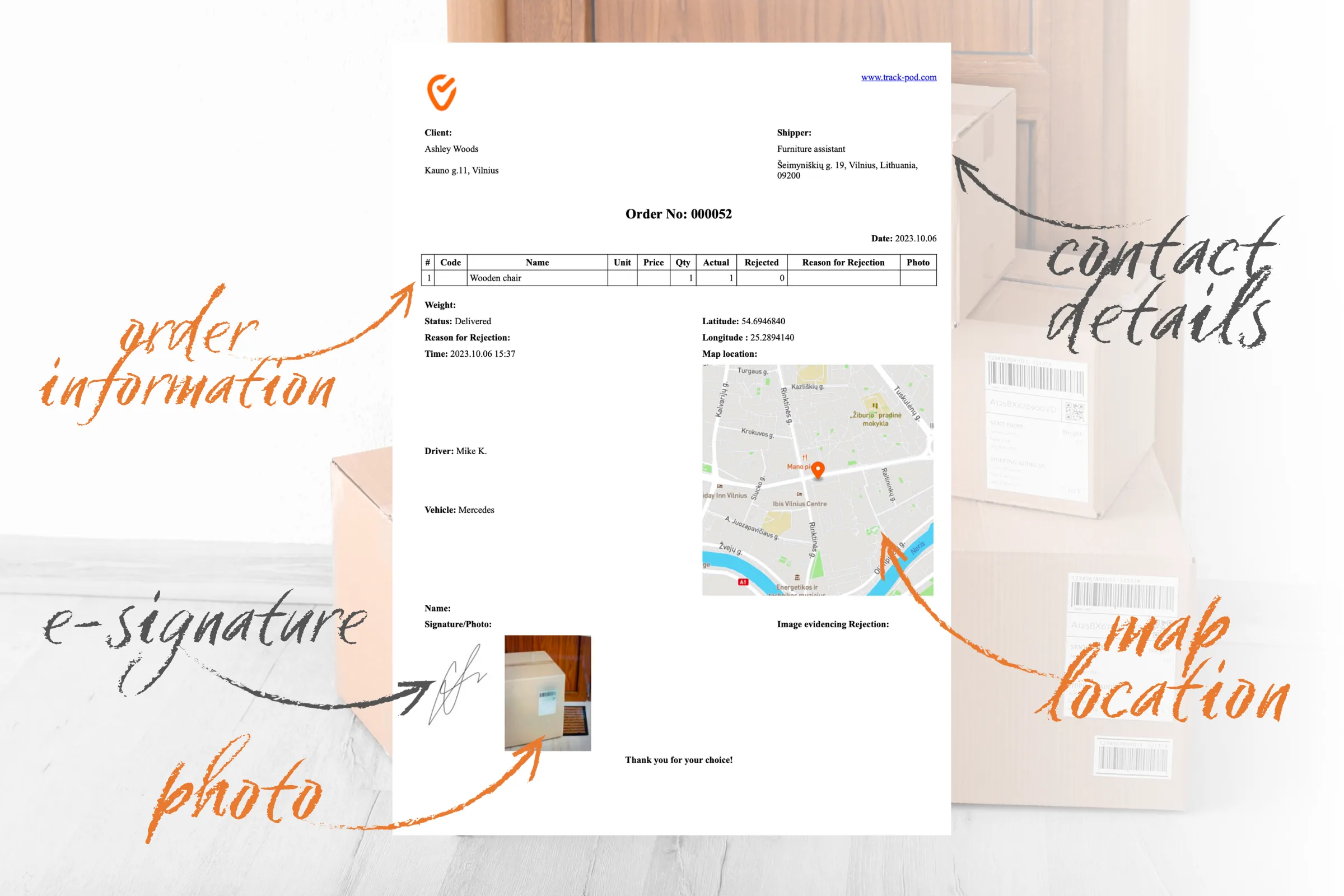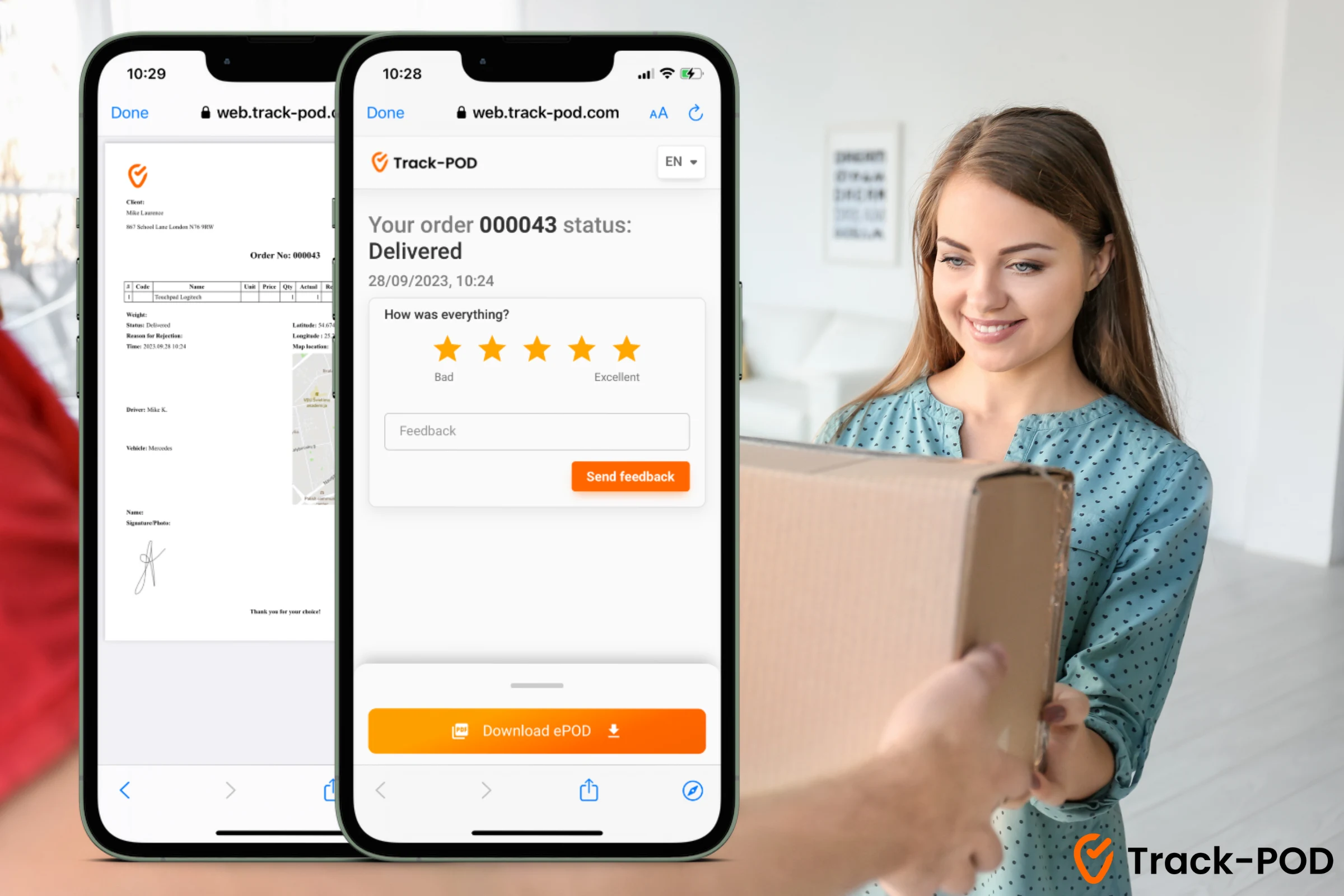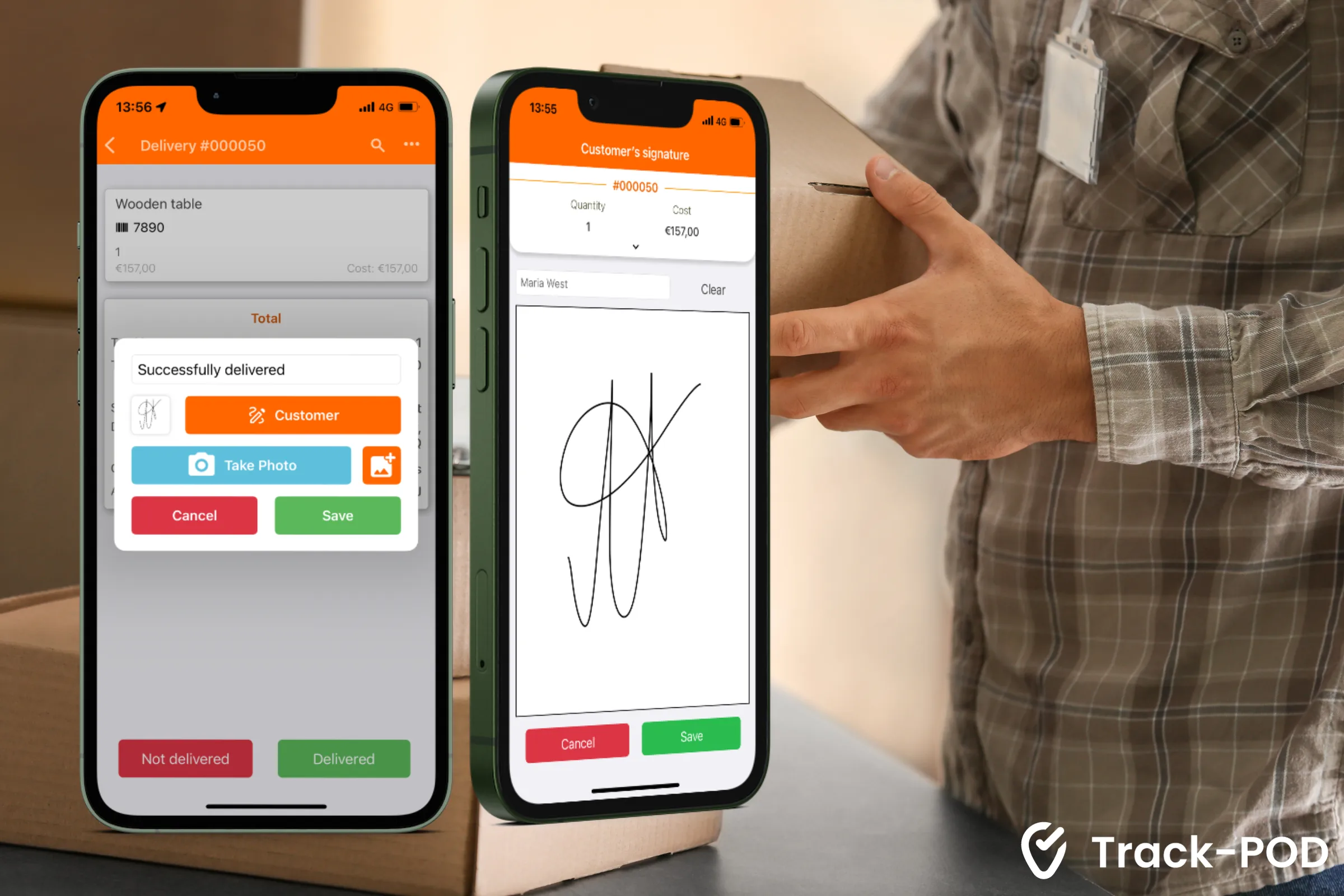Proof of Shipment OR Proof of Delivery - Why You Need Both
Updated on
junio 28, 2024
by
Alisa Cvilij

If you work in logistics, proof of shipment and proof of delivery documents are critical for your organization.
You must ensure these files are included in your delivery process to stay organized and keep your customers happy. Without them, you could run into all kinds of logistical and organizational nightmare scenarios.
Proof of shipping and proof of delivery both function as order confirmation receipts.
However, each document is unique and plays its own important role in the supply chain.
We’ll explore the differences between proof of shipment and proof of delivery documents in last mile logistics, and discuss why both are so important for your operations.
What is proof of shipment?
What is proof of delivery?
Proof of shipment vs proof of delivery
Why should you have both?
Benefits of tracking proof of delivery
Challenges of tracking proof of delivery
What is proof of shipment?
Proof of shipment needs to be sent out every time an order is processed and dispatched.
The proof of shipment document may be in the form of a physical receipt or a digital file. It shows that the shipment has been sent out.
The document will include the time and date of shipment, customer name and contact number, the zip code, and any specific delivery requests.

- The proof of shipment document is the best way to certify that an order has been dispatched and is on the way to the correct recipient.
- The client information on the document must match any details the customer provided when making the transaction.
- The recipient should receive a copy of the proof of shipment to confirm that their order has been dispatched and is heading to the correct location.
- Proof of shipment does not certify that the order has been received or that the person receiving the package is happy with their delivery.
- This document acts as a kind of courier or driver receipt. It is now the responsibility of the courier or driver.
What is proof of delivery?
Proof of delivery (POD) acts as an order receipt but for the completed delivery.The POD document shows that the order has been successfully delivered to the recipient.

A proof of delivery document typically comes in two formats:
- Physical (traditional);
- Electronic proof of delivery (ePOD).
Sending proof of delivery is the very last step in the delivery process. Once a delivery is completed, the document is shared with the package recipient.
The Track-POD Drivers’ app allows the customer to sign on the phone, eliminating the need for a physical document. If the customer is not available, a no-contact delivery can be effected with a photograph of the package in the correct location.
Proof of delivery structure
Proof of delivery document should include all the necessary order and delivery details, such as delivery time and date, name and contact details of the recipient, delivery address, courier details, and proof of delivery.
The customer is usually expected to sign their proof of delivery document to certify that the order has been fulfilled. By signing, the receiver agrees that the package is correct and that the goods are in the appropriate condition. In the case of a no-contact delivery mentioned above, the electronic proof is sent to the customer via the mobile app. A copy is also sent to the dispatcher back at the warehouse.
In Track-POD, you can fully customize your proof of delivery template and add one or several POD forms.
Track-POD offers the following proof of delivery formats:
- Electronic signature (courier's or recipient's);
- Photos (up to 10);
- Location coordinates (geotag or manual entry by the courier);
- Goods quantity;
- Cash on Delivery (COD) amount;
- PIN code.

Once proof of delivery has been added or signed, a copy is passed onto the recipient. This acts as proof that the goods are in the customer's possession and under the customer's responsibility.
In the world of logistics, the proof of delivery document is essential for accountability and tracking delivery success.
What happens when goods are rejected?
- In case of a partial rejection, the POD or ePOD must still be signed.
- Notes must be made about the quantity and description of goods rejected.
- A reason must be given for the rejection.
- In the case of a complete rejection, POD does not have to be signed, but a note must be made giving the reasons for rejection.
Proof of shipment vs proof of delivery
Receipt of shipment and receipt of delivery may seem like two very similar things.
However, they both perform unique functions. Using both of these documents for your logistics operations is incredibly important.
-
The main difference between the two is that a receipt of shipment exists to prove that an order has been shipped but not delivered yet.
- This is to certify that the items in question are no longer in the hands of a warehouse and that they are now the courier's responsibility.
Proof of shipment does not prove that the buyer has received their package or that on-time, in-full delivery occurred. It shows that goods have progressed to the next delivery stage.
In many cases, a receipt of shipment is used to transfer responsibility for a package between two businesses.
An example is an organization with its own warehouse but uses an external delivery company. Proof of shipment shows that the goods have passed into the hands of the next company.
Proof of delivery, on the other hand, is there to show that the shipment has been completed.
This is a kind of receipt for the customer to prove they received the order. If the customer does not reject some or all of the items, then the delivery is complete. If they reject part or all of the delivery, the driver or customer must record the reasons for rejection on the POD or ePOD. Proof of delivery is customer-focused. This is the point where the customer accepts responsibility for the goods.
See the table below, which summarizes the main differences between proof of shipment and proof of delivery.

Why should you have both?
Tracking receipt of shipment and proof of delivery is essential because documents cover different functions. You can’t just rely on one.
Both are required to make sure that each stage of your delivery process is properly tracked and recorded.
One of the main reasons to use proof of shipment and proof of delivery is accountability. These documents exist to prove exactly who is responsible and accountable for each stage of the delivery. This can help with any possible customer disputes or legal issues.
Proof of shipment and proof of delivery state exactly when, where, and by whom the delivery was passed on to its next stage. This makes it easier to go back and trace order fulfillment.
If you manage deliveries and logistics, then you understand the importance of carefully monitoring every step of the process.
Keeping track of every step in each delivery process can be incredibly challenging if multiple deliveries occur.
Proof of delivery and proof of shipment make it easier for delivery managers to keep a clear record of the different steps in the delivery cycle. It also helps customers to keep track of the different steps.
Benefits of tracking proof of delivery and proof of shipment
Now that we know what proof of delivery and proof of shipping documents are, let's look at some of the main reasons why keeping track of them is important.
Accountability
Firstly, there’s the matter of accountability, which we already touched on above.
Proof of delivery marks the point where accountability is passed on from the merchant to the recipient.
Signing POD adds legal accountability and can help minimize customer disputes.
As there are various parts in a supply chain, it’s essential to understand who is held accountable at which stage.
- By using POD and proof of shipping documents, logistics managers can break down the different areas of responsibility across this chain.
Customer satisfaction
We know that consumer demands are constantly increasing when it comes to e-commerce deliveries.
A proof of delivery document empowers the customer by letting them inspect the parcel before accepting it.
This helps customers identify any potential issues with their goods. It also gives them more confidence in your delivery service.
- Together with proof of delivery, you can collect customer feedback on the service provided.

Organization
Tracking proof of delivery and proof of shipment is an easy way to keep things organized.
Logistics and fleet managers have a lot on their plates, especially when dealing with multiple delivery stops and routes each day.
Offering clear POD is an effective way of understanding exactly when each delivery was made.
- By storing all proof of delivery documents in one place, managers have easy access to them. They can use them to analyze their daily deliveries and gain insight into their operations.
Tracking
An essential role for any logistics manager is to keep careful track of the progress of their delivery routes.
One of the benefits of using the right delivery management software is the digital proof of delivery document (ePOD). These documents can be saved in a database and accessed from anywhere.
- With Track-POD, you can send a copy of the POD to multiple recipients as soon as the order has been delivered. The list can include dispatchers, shippers, and customers. When paired with SMS and email delivery notifications this makes it much easier to track and keep up with the shipping process.
Delivery Analytics
Automated Proof of delivery is helpful for capturing a clear set of delivery information. With the right software, delivery companies can understand each delivery's exact time and location.
- They can track which drivers made which deliveries and when. Beyond being organized, this also helps monitor progress for better reporting and analytics. This is essential for staying up to date with your business and finding areas to optimize it.
Challenges of tracking proof of shipment and delivery
Delivery receipts offer clear value to any business and its customers.
However, challenges might still prevent businesses from utilizing these documents. We’ve outlined some of the main challenges below.
Time
Although these documents seem simple enough, converting them into delivery schedules can be time-consuming.
In addition, delivery drivers must be able to capture all the necessary information (signatures, photos, other POD forms) as they make deliveries.
Keeping this information accurate while operating a busy delivery schedule can be challenging.
Time is incredibly valuable in logistics, and each moment must be carefully planned.
- Customizing your POD document and automating the data entry process can reduce service time at each stop. In Track-POD's driver app, couriers can add signatures and other forms of POD with just a few clicks.

Tracking
In order to offer accurate proof of shipment and delivery, businesses should consider utilizing a smart tracking system. This would mean keeping up to date on real-time delivery progress to ensure that the time stamps on the documents are completely accurate.
Any accurate proof of delivery must have an exact delivery time, date, and location. To offer efficient and reliable results, this would be generated alongside the GPS tracking software.
Paperwork
Industries around the world are undergoing logistics transformations.Small and medium-sized businesses must keep up.
When tracking proof of shipment and delivery, we need to look towards paperless solutions, like ePOD. For many businesses, this might mean switching over to a new software system.
Track-POD offers a total solution with their Last Mile Delivery Software. You can schedule all deliveries, track your vehicles, and effect paperless e-PODs. Last mile delivery software will ensure that all delivery and receipt times are saved, and integrated with your CRM, ERP, and WMS systems if you choose.
Final thoughts
One of the most essential parts of running a delivery operation is recording and tracking each delivery.
This is important for both the customer and the logistics manager.
Using accurate proof of shipment and proof of delivery documents is a must to achieve the best possible outcome.
These two features are used in unique scenarios with specific goals. Using both of them is important because they each perform a crucial function.
If you want to improve logistics management, using the right proof of shipment and delivery software is essential.




